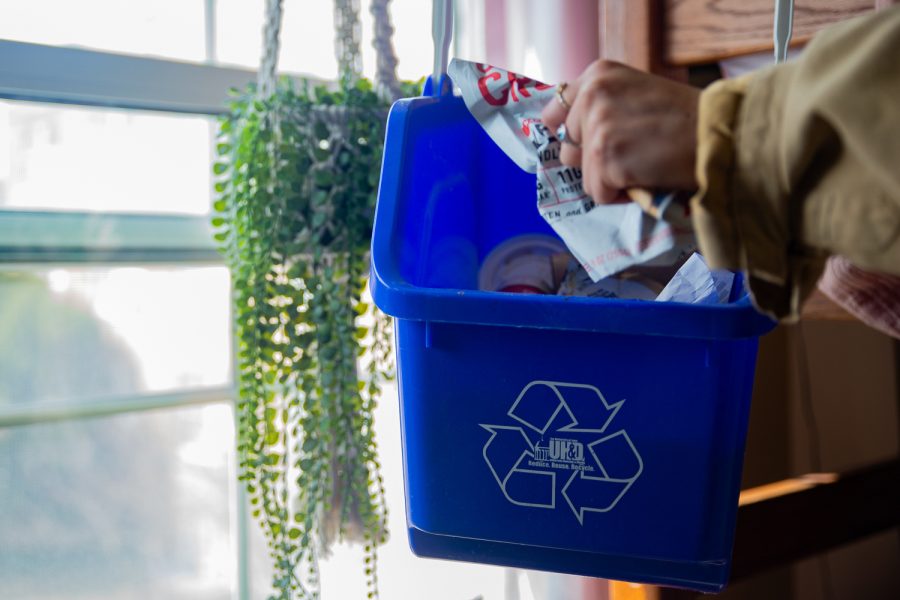Buzz around sustainability has been growing on the University of Iowa’s campus. From new initiatives to lively discussions, it seems like sustainability is everywhere — and for good reason.
At its core, sustainability is about meeting today’s needs without compromising the environment for future generations. It used to be a niche concern, but now it’s a central focus in education and university policies.
As the UI embraces sustainable practices, we have the opportunity not just to learn about sustainability, but to actively participate in it.
Let’s face it: Climate change is impacting us all, even here in Iowa. We’re experiencing rising temperatures and more intense storms, which threaten our agriculture, infrastructure, and public health.
According to the Iowa Climate Assessment, “In the last three decades, Iowa weather has become more extreme in many ways,” going on to list the various manifestations of climate change in the state.
The Intergovernmental Panel on Climate Change has made it clear we’re running out of time to address these issues. Its AR6 Synthesis Report: Climate Change 2023 emphasizes the urgent need for significant reductions in greenhouse gas emissions to ensure a livable future.
This is not just about saving polar bears or melting ice caps — it’s about our well-being and the health of our planet.
Here’s the good news: Each of us has the power to create change through our daily choices. Just saving 1 ton of cardboard boxes from entering the landfill prevents almost 4 tons of CO2 emissions. While this sounds like a lot, students would only need to recycle 100 to 150 standard-sized cardboard boxes to reach 1 ton.
Imagine if every student committed to practices like these. We could collectively reduce our carbon footprint and create a healthier campus environment.
The UI is already making strides toward sustainability. The Sustainable Campus Action Plan aims to cut greenhouse gas emissions and enhance campus biodiversity, showcasing our commitment to reducing environmental impact.
Campus-wide landscaping efforts also contribute to sustainability, while initiatives like the UI Student Garden and student-led programs such as Net Impact foster student collaboration and innovative solutions.
Additionally, the UI is incorporating sustainable practices across the campus. The Cambus fleet, for example, has adopted biodiesel and electric buses from a $16 million grant, reducing its carbon footprint.
What’s in it for you? Well, sustainable practices can improve our well-being.
As energy costs rise, adopting sustainable practices can lead to significant savings for the university, potentially freeing up resources for academic programs and student services.
You might be thinking, “Do we really need to focus on sustainability? Isn’t it just another trend?” This skepticism is understandable but ignoring sustainability can lead to more significant costs down the road.
In Iowa, climate-related disasters, such as increased flooding and intense storms, have already disrupted communities and impacted public health. These events, much like Hurricane Helene, demonstrate how such events lead to widespread damage and stress, displacing communities and causing long-term psychological effects.
The cost of climate-related disasters in the U.S. is sitting at $92.9 billion and steadily rising with billions spent annually on recovery efforts. Investing in sustainable practices today not only helps mitigate these disasters but also ensures a more stable and healthy future for our campus community, reducing long-term costs and environmental harm.
Awareness is crucial, and events like Sustainability Week aim to engage students and promote participation. However, we need more active involvement from the student body.
Our sustainability efforts must be inclusive, ensuring that varied voices — especially from marginalized communities — are heard in decision-making processes. Marginalized groups are often disproportionately affected by environmental issues but have less access to sustainability resources and initiatives.
Research from The Race Report found that 4.8 percent of environmental professionals identify as Black, Asian, or minority ethnic, compared with a 12.6 percent average across all professions. The university has a responsibility to create an environment where all students can contribute to these initiatives, fostering equitable access to resources and opportunities, and encouraging more diverse students to pursue careers in environmental professions.
Imagine walking through the UI campus filled with clean air, lush green spaces, and thriving ecosystems. This vision is within reach, but it requires all of us to step up today.
As we navigate our educational journeys, let’s not allow fear or despair to hold us back. Every action counts. Every voice matters.
The time to act is now. For ourselves. For our university. For our planet.



